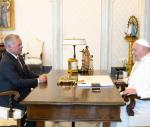You are here
Tunisia’s Islamist party becomes biggest in parliament as ruling partner splits
By Reuters - Jan 12,2016 - Last updated at Jan 12,2016

Tunisian Prime Minister Habib Essid delivers a speech at the Assembly of People’s Representatives in Tunis, Tunisia, on Monday (Reuters photo)
TUNIS — Tunisia’s moderate Islamist Ennahda became the biggest party in parliament on Monday, after more lawmakers in President Beji Caid Essebsi’s party resigned over the role of his son, saying they feared a return of hereditary transfers of power.
The rift poses no immediate threat to the coalition government, which includes Ennahda, but comes at a delicate time as the North African state struggles to contain militant violence and revive economic growth.
The political turmoil may complicate attempts to push through sensitive reforms Tunisia’s international lenders are demanding to curb public spending and kickstart an economy hobbled by three major militant attacks last year.
With a new constitution and free elections, Tunisia has become a model of democratic transition since the fall of Zine Al Abidine Ben Ali, and has largely escaped the violent upheaval seen in other countries in the 2011 Arab Spring uprisings.
But divisions have been deepening inside Essebsi’s Nidaa Tounes, a secular party formed after the 2011 revolt, since a dispute emerged last year between a faction led by the president’s son, Hafedh Caid Essebsi, and another led by Mohsen Marzouk, one of its founders.
After initial resignations last week, 11 more lawmakers said they were bolting from Nidaa Tounes on Monday, bringing the total number of departures to 28. That leaves the party with 58 lawmakers in the 217-member congress, while Ennahda has 69.
Departing MPs said their fears Hafedh Caid Essebsi was seeking control of the party were reinforced on Sunday when he was appointed to its central committee as legal representative and general secretary. They have denounced what some regard as a return of the autocratic, nepotistic style of the Ben Ali era.
“I decided with other eight lawmakers to resign on Monday... The total resigned is now 28 and the number may rise in coming days,” lawmaker Sabrine Ghoubatnini told Reuters.
“Our resignations come in protest against the policy of exclusion and the hereditary transfer of power to the president’s son,” she added.
Related Articles
TUNIS — Tunisia's ruling party Nidaa Tounes on Saturday elected two leaders, one of them the president's son, in two parallel congresses, de
TUNIS — Tunisian Prime Minister Youssef Chahed said on Tuesday that the president’s son had destroyed the ruling Nidaa Tounes Party and that
TUNIS — At least 10 senior leaders quit Tunisia's ruling party on Wednesday, as a wave of resignations in a dispute over the role of the pre















